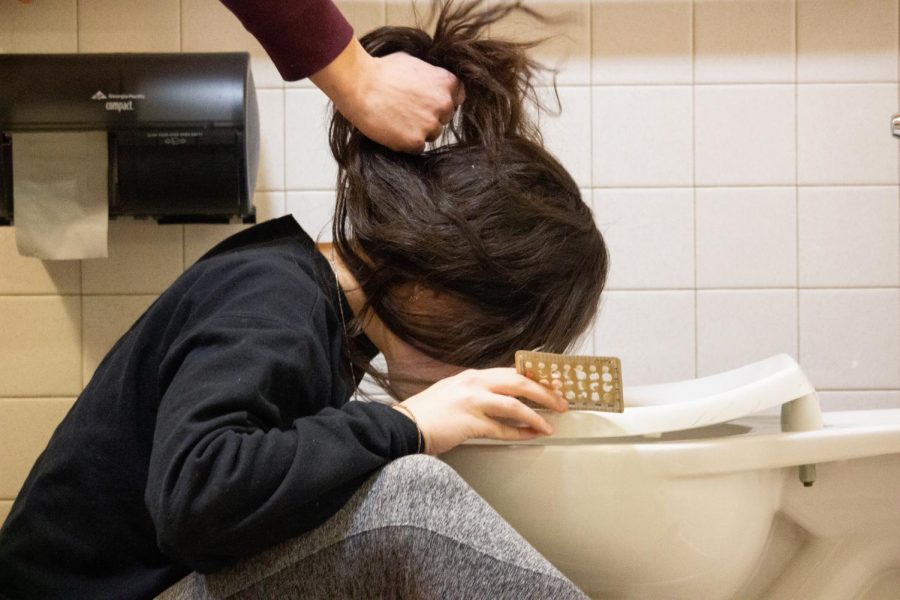Understand your body before taking birth control
Pills can have different effects, practice caution in hormonal ingestion
SAWYER MCDONALD | EVERGREEN PHOTO ILLUSTRATION
When the birth control pill was not an option and the Mirena IUD gave this writer migraines and hormonal acne she had to hunt for a solution — NuvaRing.
February 15, 2019
College students have sex, and all of us have different bodies with their own hormonal cycle. Finding the right birth control method can be effortless for some, but for others it can take months of trial and error. As a sufferer of hormonal migraines, my journey was not an easy one.
“A more permanent option might seem really invasive to some,” said Sydney Pederson, senior psychology major and president of Sex Talks. “But others might not notice it day-to-day and it’s more secure than taking a pill every day and possibly forgetting it — having options that work for everyone makes birth control more accessible.”
As someone who suffers from migraines and mental health issues, I take a lot of medication. Finding new medications that don’t clash with my current ones can be incredibly difficult, and it took me six months and several different birth control methods to find a contraceptive that worked for me.
First, I found out my migraine preventative medicine would interact with my original method – the combination pill – to make it less effective, and put me at risk of an unwanted pregnancy. My doctor and I also determined the combination pill actually caused migraines, so it had to go. Any pill with ethinyl estradiol – a form of estrogen – would be ineffective in combination with the medication I was taking to allow me to live my life free of pain.
Next, I learned I would be losing my health insurance and only had two months to find a contraceptive I could get for cheap without insurance. Progestin-only pills were not available through the programs I knew about, so any pill was no longer an option.
Then I learned about the hormonal IUD, Mirena. After just 20 minutes of pain, I’d be period-free, baby-free and migraine-free for five years – at least in theory. I had the IUD placed during dead week of fall 2018 while my boyfriend held my hand and drove myself home after.
The next four days were atrocious. I remained in bed with a hot pad glued to my abdomen 18 hours a day. As the days went on the pain in my uterus faded and started to migrate toward my head. Soon I was having three debilitating migraines daily and popped Excedrin like candy.
I blamed the stress of finals week and waited until after winter break to make the final decision about if the intruder in my uterus could stay or go. The “abnormal period” I’d been warned of lasted two full weeks and nearly sent me to the emergency room. I truly thought something was wrong because of the pain.
The migraines didn’t go away, and I decided the seemingly perfect Mirena wasn’t for me. I could feel it whenever I exhaled fully. Not a day went by without multiple hours of excruciating pain in my right temporal lobe. I even suffered from hormonal acne for the first time in my life. I had my Mirena removed during my first week back on campus and had no idea where to go next.
“It’s important to know about all the different types of contraception because knowledge is power,” biology professor Karin Biggs said. “When we don’t know about our options, we think it’s okay to live through side effects that we don’t necessarily have to live through.”
When I finally started the NuvaRing I was terrified of it. From television, movies and comedy specials, I’d formed a picture in my head similar to a thick, firm bracelet. I had no idea how I’d fit this object into my body, and I didn’t think about the irrationality of that image. When I opened the box, I saw three individually wrapped silly band sized, flexible rings. My terror vanished.
Immediately, my hormones balanced out. My acne faded, my cramps disappeared and magically my migraines completely vanished. I was able to live again, free of pregnancy scares and severe pain for the first time in months.
This is my story, but there are many health factors that can interact with birth control and there are many options to address those different needs. Don’t get discouraged.
“Contraceptives are important because they can help you manage your life in a way that is beneficial for you and the lifestyle that you want to lead and to make sure you’re not impeded by your own body raging against you,” Pederson said. “There are many people on hormonal birth control to help control their menstrual cycles and that’s totally okay.”









